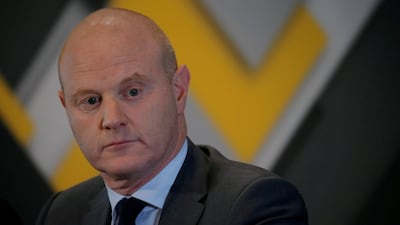Commonwealth Bank of Australia will embark on a global search for a new chief executive after saying Ian Narev will step down within 10 months, as the nation’s largest lender seeks to mitigate the fallout from a money-laundering scandal.
The announcement of Mr Narev’s pending departure comes less than a week after the bank said the 50-year-old “retains the full confidence of the board” in the wake of a legal suit alleging it breached money-laundering rules more than 50,000 times.
The chairman Catherine Livingstone said the move was part of ongoing succession planning, and batted away repeated questions during a 30-minute media call whether Mr Narev’s departure was linked to the money-laundering suit, the latest in a series of scandals during his almost six years at the helm.
And in another reputational blow, the securities regulator said Monday the bank would refund about A$10 million (Dh29m) to more than 65,000 customers for selling them unsuitable insurance on products such as credit cards and car loans.
The exact timing of Mr Narev’s departure will depend on how quickly the bank finds a successor, with the board undertaking a “comprehensive internal and external search process,” Ms Livingstone said announcing the move.
His replacement must move swiftly to restore trust in the bank, according to Raymond Lee, a Sydney-based money manager at Kapstream Capital.
“Step one is obviously to clamp down on the scandals so that reputationally the bank is held in good stead,” Mr Lee said.
_______________
Read more:
UAE banking customers prefer mobile apps over call centres
Fintech service companies challenge modern banking systems
Saudi banks to maintain profitability despite pressure, Moody's says
_______________
Pressure has built on the Commonwealth Bank amid allegations by the nation’s financial crimes agency that drug syndicates used its network of deposit machines to launder cash, despite warnings from police. The nation’s securities regulator opened its own inquiry last week and the governor of the central bank called for accountability in the banking industry, which is beset by a string of scandals.
Narev has presided over a market-topping stock price since he took over as the chief executive at the start of December 2011. Last week, he delivered the bank’s eighth consecutive record profit.
Commonwealth Bank shares rose 1 per cent in Sydney trading. The stock has fallen about 3.5 per cent since the suit was filed August 3.
Yet his achievements have been overshadowed by the money-laundering allegations - the third major public-relations scandal he has faced as chief executive. The bank has paid A$29m in compensation to customers who were allegedly given poor financial advice, and has faced accusations it wrongly failed to honour insurance claims to sick clients.
The financial crime agency, Austrac, alleges that Commonwealth Bank failed to report either on time or at all suspicious transactions through its network of automated cash deposit machines totalling more than A$624m, and it failed to monitor the activities of drug syndicates even after being alerted by police. The bank has blamed most of the breaches on a software coding error which has since been fixed.
The personal cost to Mr Narev, who last week along with other senior executives was stripped of his bonus, was also revealed Monday. That contributed to his total pay falling to A$5.5m in the fiscal year ended June 30, from A$12.3m the previous year.
Ms Livingstone downplayed the timing of Mr Narev’s departure, saying the announcement “hasn’t been rushed”, responding to questions about what had changed since last week when the board expressed its confidence in the chief executive.
Given Mr Narev was approaching the end of his sixth year in the role, the same tenure as his predecessor Ralph Norris, there has been “active and continuous” discussions about a succession plan, Ms Livingstone said.
“Speculation on Ian’s tenure has been going on for some time, and it certainly intensified in the last little while,” she said.

